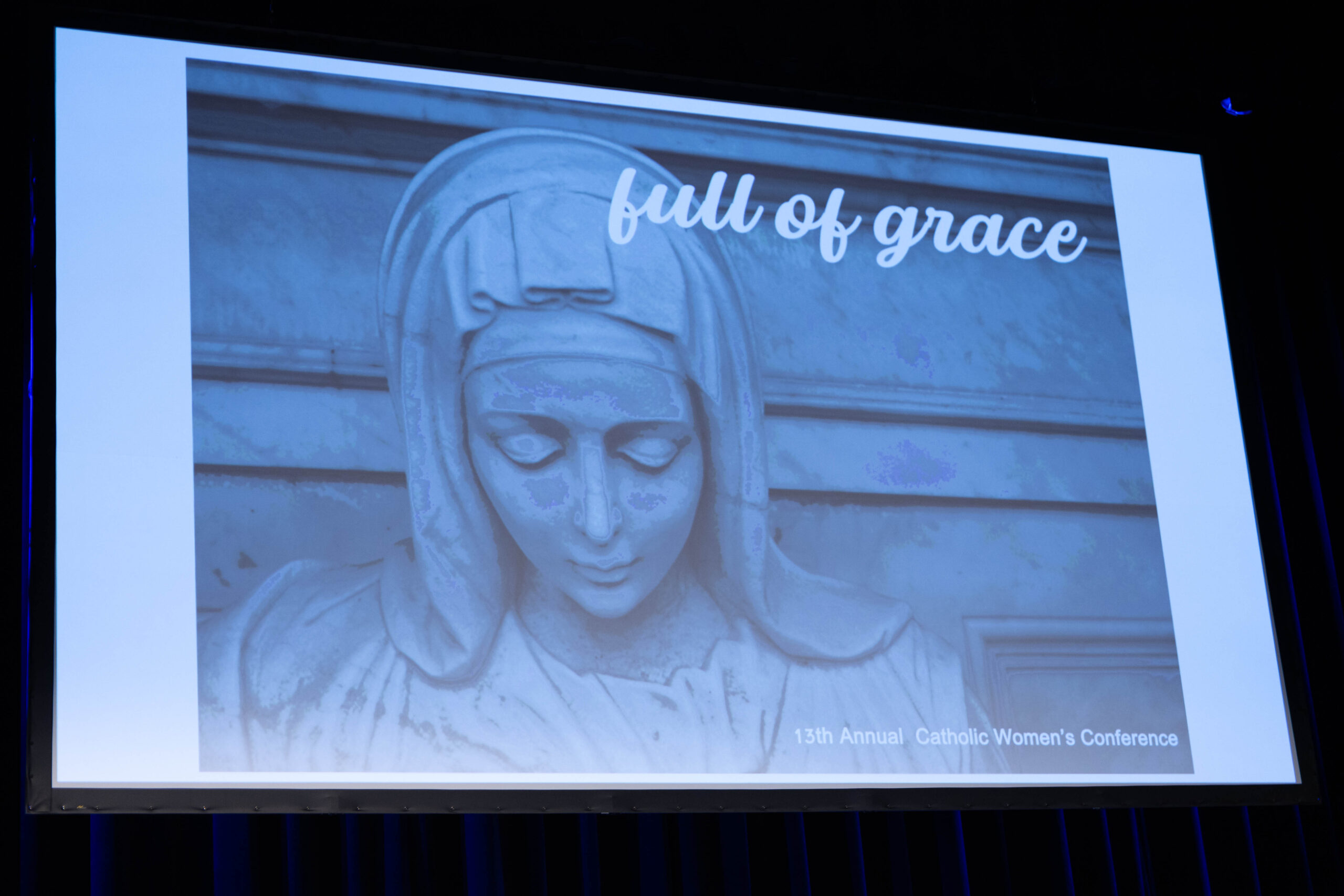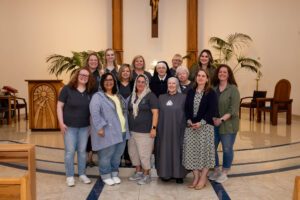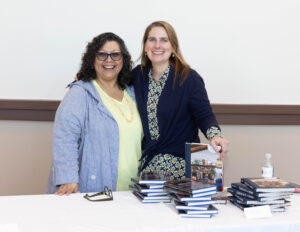Catholic women’s conference proposes femininity, not feminism, in this year’s “Full of Grace” event.
God poured out his grace to fill many feminine hearts at this year’s annual Phoenix Women’s Conference. On January 27th approximately 280 women traveled from throughout the diocese to Xavier College Preparatory Catholic High School in Phoenix. They came to rediscover the meaning of authentic femininity as they considered this year’s conference theme, “Full of Grace.”
The title of Our Lady “Full of Grace” is often at odds with our culture’s image of femininity. Mary’s name “Full of Grace” reveals the truth of the feminine genius; a power that is humble enough to be filled with God. Throughout the day, conference attendees were challenged to reclaim the truth of their femininity as being distinct from the narrative of feminism that the world presents to them.
Michelle Lorenzana, a licensed Marriage and Family Therapist who runs Totus Tuus Therapy Clinic in Phoenix, attends the conference annually:
“As a Catholic mom, wife and therapist this is my self-care. Once a year I get to come and spend time with other women in adoration and confession and just kind of find myself again… It’s good to have someone direct us and remind us how special it is to be a woman, to be feminine and that [being a woman] is not about achieving all these accomplishments…We are most accomplished in just living God’s will.”
Roberta Bazaldua, marriage prep coordinator and nullity minister at St. Thomas the Apostle Catholic Church in Phoenix, originally came onto the conference team to help in recruiting priests to hear the attendee’s confessions. She has been Chairwoman of the conference since 2013.
“We are a conference, we are not a retreat. We are not here to raise people to a spiritual or emotional high. If that happens it’s a byproduct, but we’re here to talk about the truth of our faith,” Bazaldua explained.
“My personal goal is to always bring speakers out who not only engage and inform but also challenge,” she said.
Challenge they did and right from the get-go… The conference’s opening speaker, Becky Greene shared her conversion story and how she went from being an unquestioning feminist to rethinking her whole world view on womanhood. She found freedom in the Catholic church’s distinctly “pro-woman” teachings. Greene, a co-broadcaster with her husband, Steve Greene, of the Diocese of Phoenix’s podcast, “The Catholic Conversation,” is now a homeschooling mother of five.
“In my opinion, Catholic women should not wear feminism as a badge of honor,” said Greene.
“I’m going to make a bold statement here and say that Eve was not just the first woman but she was actually the first feminist. Why? Because she was seduced by a lie: she disobeyed her father, she went around her husband and she grasped for something that wasn’t hers to have…I think that adequately describes feminism in a nutshell… prideful women insecure about their own femininity reducing themselves to a ‘what’ rather than a ‘who’, seeking to go above and around masculinity and unplugging the essence of who they are in the first place by sterilizing and contracepting themselves… and calling that liberation and empowerment when all it does is enslave.”
She then spoke on the difference between the missions of men and women.
“Adam is charged with a special mission… He sees in the horizon a call to go out. To this day men are at their best when they are conquering and elevating, building things, and protecting women with care. We owe men our gratitude because it was men, in living out their mission and call, that has brought us to a place where we have lights and cars and water flowing and buildings to live in.”
“Eve was placed in the garden, not as a secondary figure: she is not less than but equal to…When she first appeared, yes the horizon was in the background, but the first thing she sees is the other- Adam himself. That gives us an insight into her mission; she is person oriented…Women by design are inclined toward relationships- that’s why we gather and gab in the bathroom together! Men don’t do that – it’s an unofficial “no thing” that men don’t talk while they’re in the bathroom,” Greene exclaimed.
“Women are called to an incarnational manifestation of the words ‘This is my body given up for you.’ It’s in this receptivity and ability to receive that allows us to embrace and envelope something good and then do something almost supernatural, pour out something better…Whether we become mothers physically or we’re motherly in our essence spiritually, we are all mothers because we are women… Contraception and abortion have shut off this light at the very center and essence of who women are meant to be. In many ways when a woman contracepts she is saying [through her body] ‘I celebrate who I am as a woman but I am killing off the very nature of my womanhood.’”
Greene’s enlivening talk led smoothly into Dr. Carie Gress’ keynote speech that afternoon. Dr. Gress earned her doctorate from The Catholic University of America in philosophy and is a fellow at the Ethics and Public Policy Center. She is also a scholar at The Institute for Human Ecology at the Catholic University of America and is the founder and co-editor of the online women’s magazine Theology of Home.
Dr. Gress’ talk focused mainly on the points made in her latest book, The End of Woman: How Smashing the Patriarchy has Destroyed Us.
“Grace includes the distinction between wisdom and foolishness,” Gress began.
She used the motif from Matthew 25 of the 10 virgins who came to the wedding feast. The five wise virgins had the oil of grace to fill their lamps, while the five foolish did not.
“I want to press into how the culture has really saturated us with a foolish mindset about what it means to be a woman and how we can combat that,” Gress continued. “There are many ways we have become foolish and this is what I want to focus on today- how do we become like the wise virgins?”
During her talk, she laid out many of the lies that we have come to believe as a culture. First, she explained the motivation behind her research:
“My main motivation for the work I’ve done…is that I look around and I see how unhappy women are; …this isn’t just something anecdotal but in fact every data point, every happiness metric, is showing that women are less happy now after feminism than they were before feminism. That’s not to say that women had an idealized perfect life… but it is saying that we are walking down a path that is making women unhappy. We are making women more medicated… instead of really giving them the desires of their heart.”
Next, she explained the source of how the feminism we know today came about.
“Everyone uses the word feminism but …it’s hard to find a definition of what people mean. My definition is very narrow and very specific.”
She defined feminism as the view that men have easier lives and that women need to become more like men. She then went on to argue that in truth, women will only be happy when they live according to the way God has created them… as women.
Gress took the conference attendees back two centuries to look at the first wave of feminism and examine the roots of the “feminist ideas that congealed in the 1800s”. Before researching, she believed what everyone had told her: the first wave of feminism was good; the problem came in the second wave. However, as she read the writings of first wave feminists such as Mary Wollstonecraft, a different picture emerged. She saw in the background of the writings of these early feminists a focus on egalitarianism, and the promotion of the destruction of hierarchies like the Catholic Church. This eventually played itself out in the social phenomenon known today as “smashing the patriarchy.”
Occult practices were commonplace among early feminists as well as the desire to “supplant or get rid of Christianity.” Elizabeth Caty Stanton, often called the grandmother of American suffrage and feminism in the United States, was the “mouthpiece behind” the social reform that Susan B. Anthony fought for. Caty Stanton was confirmed in her ideas by encounters with the occult (at that time called “spiritualism”). The Seneca Falls Convention, which is known to be the spark for the modern feminist movement, was inspired and confirmed by the messages received from Caty Stanton’s “spirit table” that moved of its own accord with communicative raps.
For a time, women’s suffrage was put on hold due to the scandalous ideas of “free love” promoted by Victoria Woodhull, a medium and prostitute. Then, as the 1920s dawned, communist leaders recharged the feminist movement and became its primary influencer.
“Preach the Gospel of discontent to women; to mothers, to perspective mothers of the human race,” was the message of communism. Their goal was to utilize the feminist’s anger to achieve their social reforms. Influencers such as Betty Friedan worked to instill the idea that “women could never be free unless they do productive work outside the home…She used psychology to make it feel like we were missing out on something if we were home with our children, who were obstacles to our happiness.”
Lastly, Gress spoke about the things we see today in feminism:
“When we look at how feminism has reigned so much of it is because the feminists are able to control everything; politics, Hollywood, book publishing, academia… …What pro-abortion feminists are promising looks like freedom and what we are promising looks like slavery because of the way that [this powerful ideology] has been framed.”
But there is hope; many women now are questioning the feminist narrative. Trends such as “soft girl” and the “trad wife” are on the rise in social media. Forty-two percent of American women still consider themselves pro-life. “So many of us are pro-life and we don’t even know each other exist… I want to help you understand that you are not alone,” Gress said.
Gress then gave women seven suggestions to help themselves move forward into the peace, joy, purpose and beauty that comes from living in union with God’s will and plan. These included questioning lies that we have been programmed to believe, being open to the “M-word” (motherhood in it’s biological, psychological and spiritual forms), breaking out of narcissism to use our gifts to help others, and sharing the truth about how feminism has harmed women.
“We can’t wait or expect men to share this message… it’s not because I don’t like men… it’s because feminism is to men a kind of kryptonite… they feel like they can’t say anything because they know the will get cries of sexism… we have to say something, it has to be us that do it.”
Grace is an unmerited gift; our Lord just pours that out upon us without hesitation. But grace compels us to act on what we have received. The fight for the truth of our femininity, is a call that we, as women, have to be the ones to answer.
“When we start raising the bar on the culture the whole culture changes. Satan knew this, this is why he went after Eve; you get the woman, you get everyone,” Gress explained.
“It works in reverse too – if those of us who are faithful start living our faith, speaking up, and realizing that what we have [been given by God in our feminine nature] is actually good and beautiful then things will change so fast,” she said.
“We are in a really dark time… but we also have this incredible opportunity because we are still being filled with grace… I want to encourage all of you, just like the wise virgins: trim your wicks and fill yourselves up with grace, because your families need you, the church needs you, the unborn need you and its not too much to say that the civilization needs you.”
Photos by Margaret Planeta








